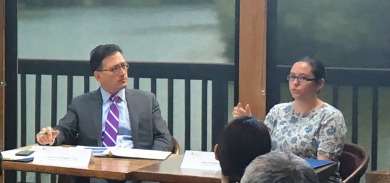 On May 18, 2016, the U.S. Department of Labor issued a final rule updating overtime pay requirements that are expected to impact more than four million workers nationally within the first year of implementation. The regulations will take effect on December 1, 2016.
On May 18, 2016, the U.S. Department of Labor issued a final rule updating overtime pay requirements that are expected to impact more than four million workers nationally within the first year of implementation. The regulations will take effect on December 1, 2016.
In anticipation of these sweeping changes in federal law, the R.I. Hospitality Association sponsored a recent seminar explaining the new regulations and their impact on employers. The program featured Higgins, Cavanagh & Cooney partner James A. Ruggieri and U.S. Department of Labor investigator Sarah Sullivan (pictured at right). The moderator was Sarah Bratko, the R.I. Hospitality Association’s general counsel.
The U.S. Department of Labor’s rule raised the salary threshold by nearly 100 percent under which most white collar salaried employees are eligible to receive overtime pay under the Fair Labor Standards Act (FLSA). The threshold levels were raised from $455 per week ($23,660 annually) to $913 per week ($47,476 annually).
The final rule focused primarily on updating the salary and compensation levels needed for executive, administrative and professional employees to be exempt from overtime payments. The U.S. Department of Labor left intact the “duties test,” which must be also satisfied in order for an employee to qualify for any one of these classifications.
An additional provision was also added to the rule that permits up to ten percent of one’s salary to be satisfied by the payment of nondiscretionary bonuses, incentives and commissions – making it a little less burdensome for employers to meet the new threshold requirements.
Ms. Sullivan addressed these aspects of the new law and highlighted additional provisions affecting highly-compensated employees whose salary threshold was also raised – from $100,000 to $134,004.
Mr. Ruggieri offered detailed steps that businesses can take in planning for these changes in the law. He offered a series of recommendations for identifying employees impacted by the new rule and presented strategies for companies to employ once the requirements take effect. He also identified serious legal pitfalls that will easily face as a result of poor planning or non-compliance.
The seminar sponsor, the R.I. Hospitality Association, represents more than 600 foodservice, hotels, vendors and hospitality members in the state of Rhode Island. It was noted that the hospitality industry will be especially impacted by these changes in the law.
Again, the final rule does not take effect until December 1, 2016. If you or an official in your organization has any question on how these new requirements will impact your business, please do not hesitate to contact James Ruggieri at jruggieri@hcc-law.com

